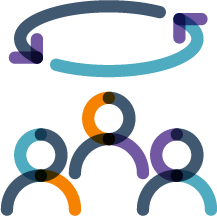Professional Scrum Competency: Developing People and Teams

Traditional management models consider the work of people and team development to be the job of the team’s manager. Scrum puts specific responsibility on Scrum Masters to support and guide Scrum Team members (as well as other members of the organization). However, team development is not only the responsibility of the Scrum Master. Since Scrum Teams are self-managing, all team members are responsible for helping the team continually improve through techniques that “develop people and teams.”
Key Focus Areas
This competency has six key focus areas:
Related Information
Facilitation, coaching, teaching and mentoring embody specific skills that are used in continuous self and team improvement. Since we use these words in every day speech, we find that there is often confusion about the differences among them. The following will help you better understand the similarities and differences among these disciplines: